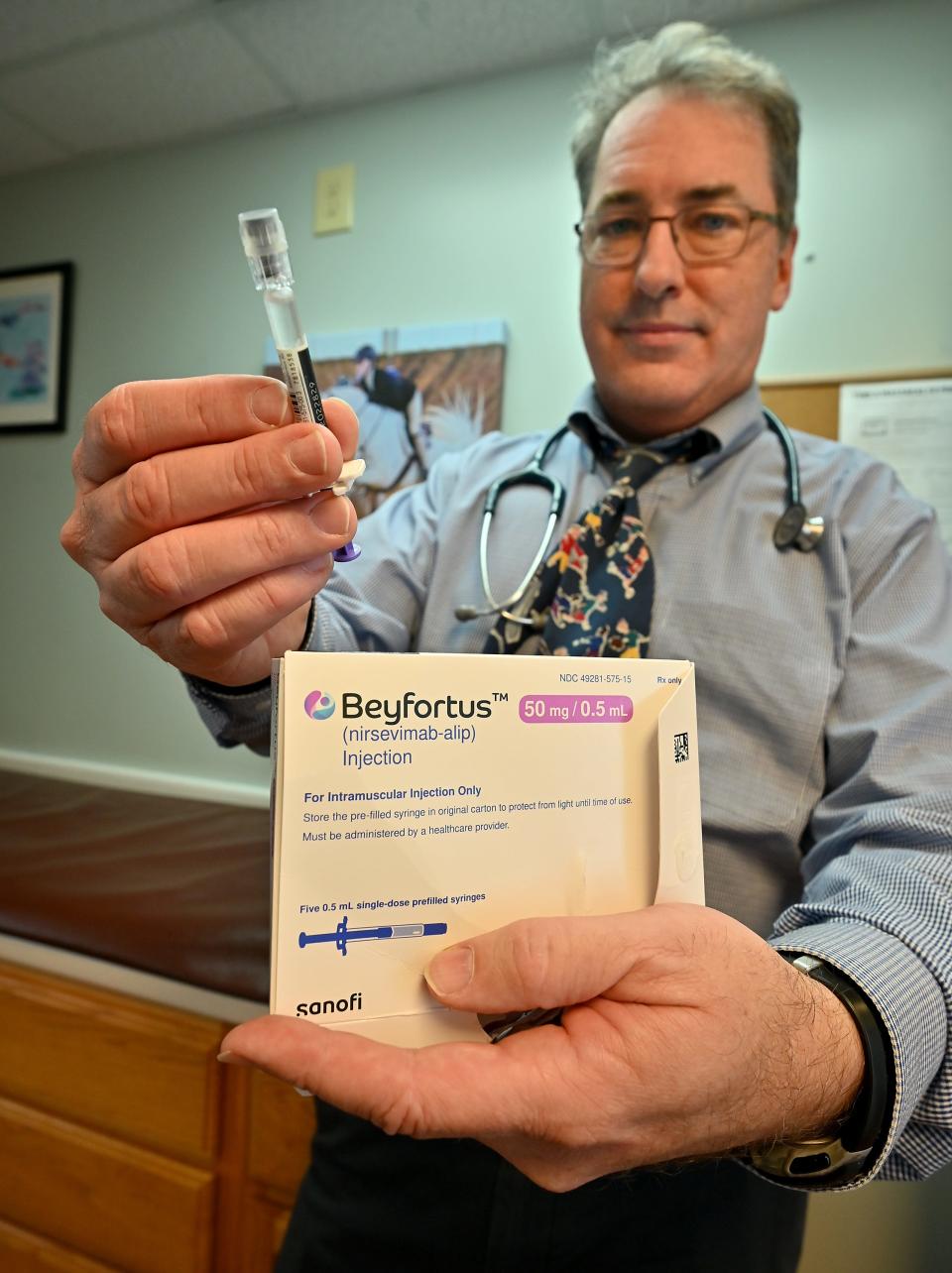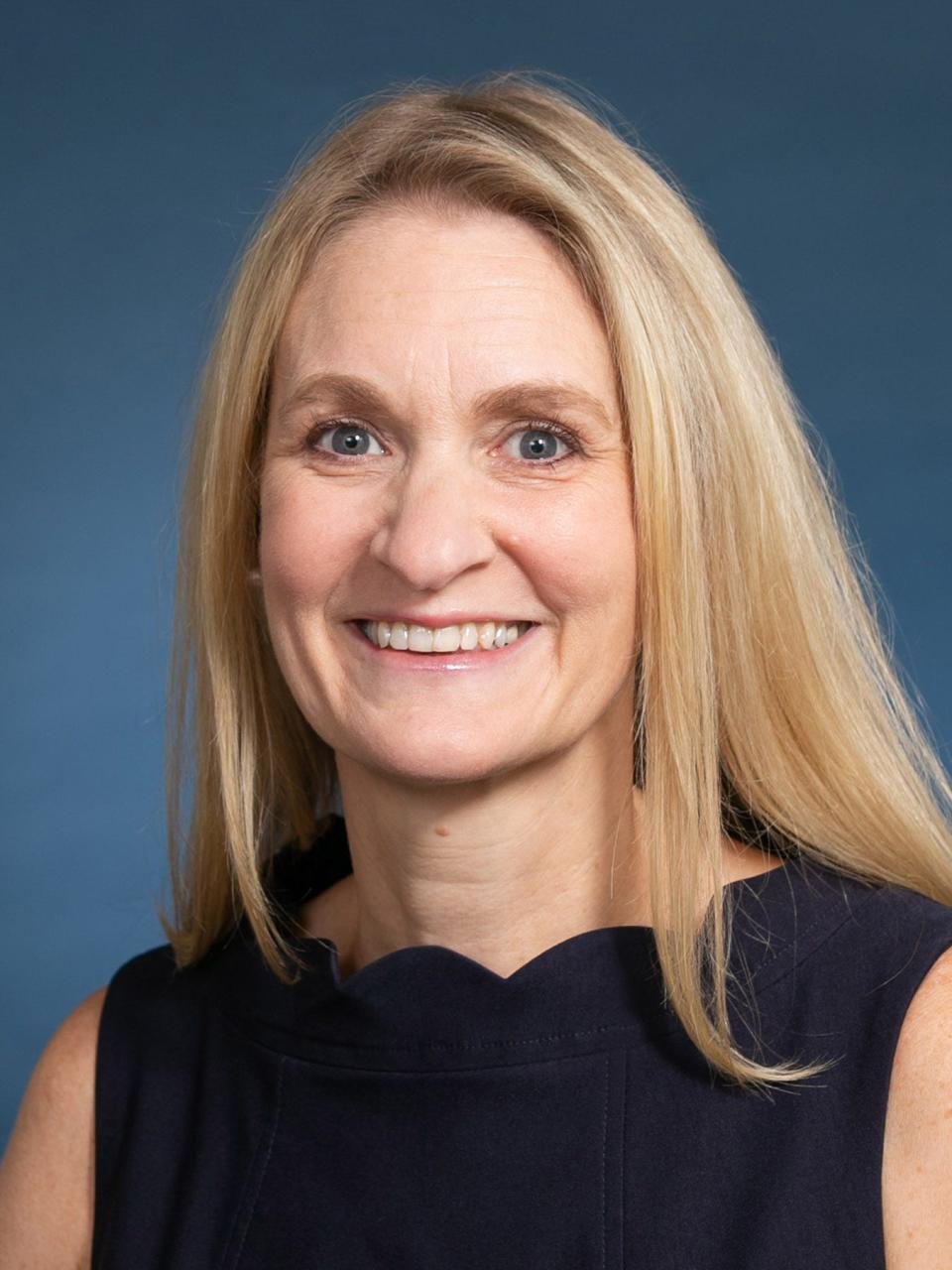Shortage of new drug to fight RSV: What are the consequences in Worcester?
WORCESTER – There is a shortage of a new drug to prevent a respiratory virus that can have serious health consequences for newborns and infants.
Nirsevimab, sold under the brand name Beyfortus, was approved in July by the U.S. Food and Drug Administration to prevent respiratory syncytial virus. But supplies are limited, based on an alert issued by the U.S. Centers for Disease Control and Prevention.

Dr. Ian Harding, owner and medical director at Harding Pediatrics in Worcester, ordered 200 doses of nirsevimab through the state Department of Public Health, received only 40 and exhausted the supply in two weeks.
“It’s like running a race with a flat tire,” said Harding of not having enough of the medicine to meet patient demand.
Harding isn’t the only local pediatrician facing a shortage of the drug, a monoclonal antibody manufactured by Sanofi. At Worcester Pediatrics, owner Dr. Paulette Kimball-Wren said her practice only got five doses, and just one dose is left.
“Did Sanofi completely underestimate the interest in this medicine? That's my thought on the whole thing,” said Kimball-Wren.
RSV: reassuring message
RSV has been around for years, most children contract it before age 2, and doctors have treated it successfully, said Dr. Estevan Garcia, chief medical officer at the Massachusetts Department of Public Health.
But what gives nirsevimab its lure is it requires only one immunization that lasts the entire RSV season that typically extends through the winter. That compares to palivizumab (brand name Synagis), another monoclonal antibody approved by the FDA in 1998 and requires a monthly dose during the RSV season.
Palivizumb is also more expensive, said Harding, and that means some families can’t afford it. There’s also the vaccine Abrysvo, approved by the FDA in August, that pregnant mothers can take between 32 and 36 weeks of gestation to protect their newborn against RSV.
But even with those alternatives to nirsevimab, parents and doctors don't take RSV lightly.
“It’s a horrible virus for babies. It hits them hard,” said Harding. He explained RSV can settle in the lungs that makes it difficult for infants to breathe. The result can be a hospital stay for the child to get the necessary medicines, oxygen support and, in some cases, intubation.
RSV by the numbers
Annually in the U.S, RSV leads to 58,000-80,000 hospitalizations among children younger than 5, according to the U.S. Centers for Disease Control and Prevention. It also accounts for 100–300 deaths in children in that age category.
Locally, while emergency room visits in Massachusetts tied to RSV remain relatively flat, there’s a slight uptick in the number of hospitalizations, according to the latest weekly report by state public health officials.
● As of Oct. 21, RSV accounted for .4% of hospital admissions statewide tied to acute respiratory disease. That is higher than .2% in the prior weekly report.
● The increase doesn’t concern Garcia, because he said we’re heading into RSV season when numbers traditionally rise over the next few months: "It’s not concerning at all. It’s a small number still."
CDC alert: Prioritize 100 mg doses during shortage
It's the 100 milligram doses of nirsevimab — for infants weighing more than 11 pounds — that is a particular concern to the CDC.
The agency's alert recommended prioritizing those doses for infants at the highest risk for severe RSV disease: those younger than 6 months and those with underlying health conditions.
Since the 100 milligram dose is given to infants weighing more than 11 pounds, it generally applies to babies who are older and already discharged from hospitals after birth. The thinking is private pediatric practices that care for these children need to manage their limited supplies of nirsevimab by giving the drug to infants facing the highest risk for severe RSV disease.
The CDC did not recommend any changes for 50 milligram doses for infants weighing less than 11 pounds.
Massachusetts received over 10,000 doses of nirsevimab, said Garcia, an amount that should help protect the highest-risk infants over the next several months. More 50 milligram doses should arrive in the coming weeks, he said. However, the 100 milligram dose is in short supply and will take longer for additional supplies to arrive.
Garcia noted the state is reserving the 50 milligram dose for hospitals with birthing units because that is where the high-risk infants are generally located.
UMass Memorial Health: supply of 100 mg dose a challenge
At UMass Memorial Health, there is enough supply of the 50 milligram dose to last for the next three to four weeks, said Dr. Wendy Timpson, clinical chief of the hospital’s neonatology division. However, the health system doesn't have enough 100 milligram supply to immunize all babies weighing over 11 pounds, according to Timpson.

UMass Memorial encourages birthing families at the hospital to have newborns weighing less than 11 pounds to be immunized with the 50 milligram dose, if the child is eligible. Not every family wants it, said Timpson, because there can be hesitancy when a new drug is rolled out.
For any mothers experiencing anxiety about the shortage of nirsevimab, Timpson noted the first thing to do is validate those feelings, then reassure the mother that RSV has been successfully treated for years. Beyond that, Timpson said the vaccine Abrysvo given to mothers during 32-36 weeks of gestation provides "excellent protection" for their baby.
There are additional protections to keep babies safe against RSV during the winter months, said Timpson, including:
● Keep a safe distance from a baby if you’re ill, so you don’t spread germs. Also, wash your hands frequently to keep germs from spreading.
● Anyone with a respiratory virus, including parents, should wear a facemask to minimize the risk of viral spread to an infant.
Harding offered one more tip. He encourages families to get their newborn immunized with the 50 milligram dose in the hospital a day or two after the birth, because there's no guarantee a dose will be available at the pediatrician's office.
"If you can get it in the hospital, you should do that," he said.
RSV: 'We know how to take care of it'
Mary Beth Miotto, president of the Massachusetts chapter of the American Academy of Pediatrics, believes Worcester is in a better place compared to other parts of the state and country, because local hospitals and pediatricians got their orders for nirsevimab in early.
She's also taking the shortage in stride.
When Miotto started her career as a pediatrician roughly 30 years ago, she said there were no vaccines for illnesses like meningitis and ear infections. Now there are, and while it took some time for those drugs to become part of the medical routine, those therapies now work like a charm. She believes the same will happen with nirsevimab.
The key, said Miotto, is listen to patients who are concerned about the shortage, and then reassure them that everything will be OK.
"RSV is not a new virus. We know how to take care of it," she said.
Contact Henry Schwan at henry.schwan@telegram.com. Follow him on X: @henrytelegram.
This article originally appeared on Telegram & Gazette: RSV vaccine for babies in limited supply at Worcester hospitals

